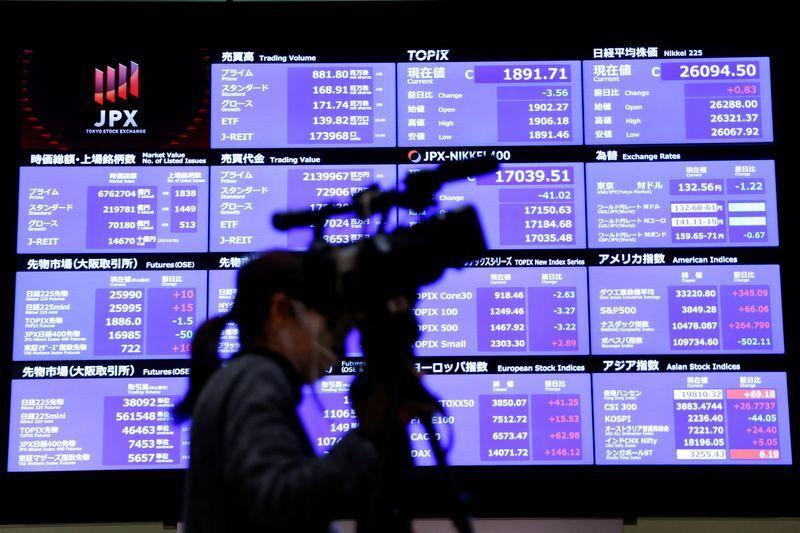Asia’s major stock indexes, for the most part, began the week on the back foot with fading optimism over China’s recovery and some US interest rate relief any time soon.
Shares across the region stalled short of seven-month highs as investors waited on inflation data from the United States, Japan and Europe that will guide expectations on possible rate moves.
The outlier, again, was Japan’s Nikkei share average which scaled record highs for the second consecutive session, supported by upbeat performances in pharmaceuticals, although profit-taking capped some of those gains.
Also on AF: China Plan to Train 45,000 Firms in Hacker Protection Measures
The Nikkei ended 0.35% higher at a new closing high of 39,233.71. The index eased from an all-time peak of 39,388.08 earlier in the session after the market resumed trade following a holiday on Friday. The broader Topix was ahead 0.49%, or 12.91 points, to 2,673.62.
The newest record comes after the index on Thursday breached levels last seen in 1989 during the halcyon days of the bubble economy.
Japanese stocks have surged on the back of cheap valuations and corporate reforms, which have succeeded in luring back foreign money looking for alternatives to battered Chinese markets. The index has gained 16.8% so far this year.
The pharmaceutical sector outperformed, with the Topix sub-index up 2.5% on Monday.
China stocks, though, slipped after rising for nine consecutive sessions, as investors lost faith in the recent rally.
China’s blue-chip CSI300 Index was down 1.04%, while the Shanghai Composite Index lost 0.93%, or 27.86 points, to 2,977.02. The Shenzhen Composite Index on China’s second exchange gained 0.44%, or 7.30 points, to 1,677.15.
The CSI300 has rebounded roughly 12% from a five-year low hit earlier this month after a combination of state-led interventions and regulatory restrictions.
And China’s President Xi Jinping held a meeting of a key economic policy body on Friday, the Central Financial and Economic Affairs Commission, to discuss providing support to manufacturers and lowering logistics costs, state media reported.
Fed Cut Hopes Fade
In Hong Kong, China’s pharmaceutical research outsourcing companies WuXi AppTec Co and Wuxi Biologics both traded up 3.6% but the Hang Seng Index dropped 0.54%, or 91.12 points, to 16,634.74.
Elsewhere in Asia, in earlier trade, Singapore dropped and Seoul and Mumbai fell. Bangkok, Jakarta and Wellington were lower too but Sydney and Taipei ended with gains.
MSCI’s broadest index of Asia-Pacific shares outside Japan dipped 0.3%, having climbed 1.7% last week to seven-month highs.
The Federal Reserve’s favoured measure of inflation – the core personal consumption expenditures (PCE) price index – is due on Thursday and forecasts are for a rise of 0.4%.
It was not long ago investors were hoping for just a 0.2% increase but high readings on consumer and producer prices suggest the risk is for a result as high as 0.5%.
Markets have already pushed out the likely timing of a first Fed easing from May to June, which is currently priced at around a 70% probability. Futures imply a little more than three quarter-point cuts this year, compared to five at the start of the month.
EU Inflation Seen Slowing
On Monday, S&P 500 futures and Nasdaq futures were both trading 0.2% lower. Eurostoxx 50 futures and FTSE futures both eased 0.2%.
Figures on inflation in the European Union are due on Friday, with the core again seen slowing to the lowest since early 2022 at 2.9% and bringing nearer the day when the European Central Bank might ease policy.
The shift in Fed pricing saw Treasury yields hit a three-month high last week, though bonds did managed to rally on Friday. The market faces a tough test later in the session when the Treasury sells $127 billion of two- and five-year notes, with another $42 billion in seven-year paper due on Tuesday.
There is also a risk some US government agencies could be shut down if Congress cannot agree on a borrowing extension by Friday.
In currency markets, higher bond yields globally have been a burden for the yen which hit multi-month lows on the euro, and a nine-year trough on the Australian and New Zealand dollars.
In commodity markets, gold was a fraction softer at $2,032 an ounce, having rallied 1.4% last week.
Oil prices have drifted lower as concerns about demand, particularly from China, have outweighed risks to supply from the Middle East.
Key figures
Tokyo – Nikkei 225 > UP 0.35% at 39,233.71 (close)
Hong Kong – Hang Seng Index < DOWN 0.54% at 16,634.74 (close)
Shanghai – Composite < DOWN 0.93% at 2,977.02 (close)
London – FTSE 100 < DOWN 0.27% at 7,685.14 (0935 GMT)
New York – Dow > UP 0.16% at 39,131.53 (Friday close)
- Reuters with additional editing by Sean O’Meara
Read more:
China Warns Market Rule-Breakers: ‘We Will Punish You’
Nvidia Worth $2 Trillion as AI Fever Grips US, Asia Markets
China, EU in Auto, Raw Materials Cooperation Talks
Hang Seng Dips as Tech Drags, China Stocks Extend Winning Run
























